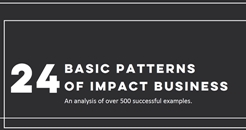 Basic patterns of impact businesses
Basic patterns of impact businesses
From a report by Reframe Ventures
Reframe Ventures looked at 500 example organisations having social impact to determine different types or models of business. They classified 12 different groups of businesses with 24 sub-groups.
The basic patterns vary from primarily socially oriented ones (such as those of the Employment group) to primarily ecologically oriented ones (such as those of the Unused Resources group). Each of the 24 basic patterns describes a different logic by which the business and impact models interact and how they jointly form the impact business model.
All basic patterns have in common that they solve social problems through business action and thus simultaneously serve the company and society at large. It is also important to note that in practice an impact business model can be built around several basic patterns and thus show different or even hybrid characteristics.
The 12 groups are:
-
Connecting Players - bringing buyers and sellers together for demand and supply of impactful products and services.
-
Employment - creating employment for disadvantaged people or micro-entrepreneurship - achieving financial sustainability,
-
Special Needs - supporting people with special needs in daily life or personal development/education or developing new products and services for special needs or therapy.
-
Raising Awareness - building knowledge about a topic.
-
Community-based Business - economic activity does not take place on the free market, but in a community in which the needs and wishes of other participants are respected.
-
Innovative Solutions - technological innovations are created aimed at solving social challenges or innovative products and services that are seen as environmentally friendly alternatives.
-
Donations - 1-for-1 models - for every product purchased, an extra one is donated to people in need or external profit donations to third parties or using profits internally for building competences and its own impact work.
-
Systemic Innovation - radically questioning and subsequently rethinking processes, procedures, and systemic functioning.
-
Using Talents - employment is created by utilising the special talents of disadvantaged groups of people or utilising the special talents of disadvantaged groups of people to create impact.
-
Supplier Empowerment - programmes are offered along the supply chain that ensure supplier independence and empowerment and a better life.
-
Unused Resources - recycling models process unused resources in a value-enhancing manner or sharing models are characterised by the fact that resources are no longer possessed, but shared or upcycling models recognise the value of “waste” and realise it economically as newly created products.
-
Impact Support - providing support in their impact creation through empowerment/consulting or by providing financial resources.
Download the full report here.
Retweet about this article:
From a report by Reframe Ventures, 27/10/2021